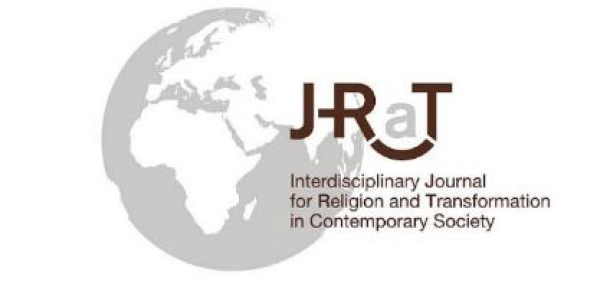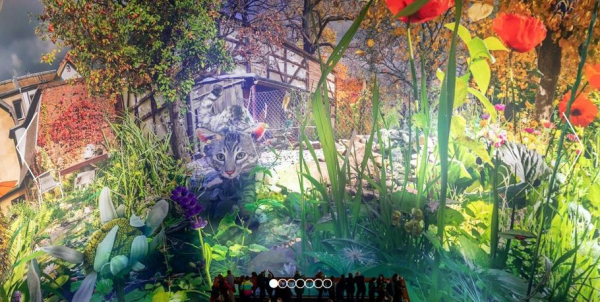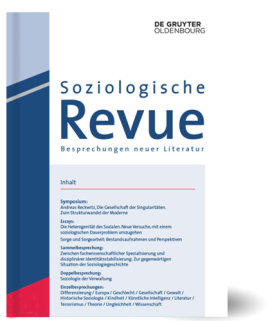|
If the newsletter does not display properly, please click here. |

|
|||||
|
|||||
|
Dear friends and colleagues, The weather in Leipzig being grey and gloomy, we want at least offer you a colourful and inspiring Wednesday Weekly. While our colloquium is taking a short break until 9 February, we have a new publication, a Call for Papers, a recommendation for an online conference and a lecture as well as a Call for Applications for you. We would also like to draw your attention to the first 2022 issue of our KFG Newsletter Inside Multiple Secularities. And with our cultural recommendation this week, we bring you a colourful and spectacular nature event even in the dark month of January. Enjoy and have a good week! Anja & Lucy |
|||||
|
|||||

|
|||||
Inside Multiple Secularities 01/2022As addressee of our Wednesday Weekly, you are always the first to be provided with the latest information about our KFG. In addition, we offer our newsletter Inside Multiple Secularities four times a year. Now, the first issue of 2022 has been published and you are welcome to forward the link to the current issue or to the newsletter subscription to interested friends and colleagues. This will keep everyone up to date with the latest projects, publications and events at the KFG. |
|||||

|
|||||
Call for Papers: Special Issue of Interdisciplinary Journal for Religion and Transformation in Contemporary Society on “Asian Religions in Europe”We would like to draw your attention to a Call for Papers for a special edition on “Exploring Asian Religions in Europe” of the Interdisciplinary Journal for Religion and Transformation in Contemporary Society. Our Senior Research Fellow Ugo Dessì, who is currently working as Professorial Fellow at the Department of Religious Studies at the University of Vienna, will be one of the issue’s editors. Starting with the work of a limited number of Orientalists and missionaries in the nineteenth century, Buddhism and other religious forms that originated in East Asia, Southeast Asia as well as Tibet/Mongolia have made significant inroads in Europe. Especially in the last few decades, also in connection with the dynamics brought about by globalization, these forms of Asian religiosity have become much more visible in Europe in various respects, including the increased presence of institutional religion and impact of specific practices and doctrines on a relatively large audience of spiritual seekers or occasionally interested people. This special issue aims to add to the existing literature and contribute to a deeper knowledge of this phenomenon by promoting the study of East/Central/Southeast Asian religions in Europe, including the scope of traditional religions, Christianities, new religious movements, and informal spiritualities in diverse regional settings. You can submit your abstract via e-mail. Submission of abstracts (approx. 150 words) by 15 February Invitation to successful applicants to submit article by 28 February Submission of article (approx. 6500 words) by 15 July
|
|||||

|
|||||
Conference on „Religionsfrieden im Kontext des frühneuzeitlichen Europa“ (“Religious peace in the context of early modern Europe”), 3–5 FebruaryThis interdisciplinary and international conference is the kick-off event for the long-term project "European Religious Peace Digital – EuReD", a cooperation between the Academy of Sciences and Literature Mainz, the Leibniz Institute for European History in Mainz and the University and State Library of Darmstadt. It explores the question of what significance religious peace regulations had on the constitution and law in early modern Europe and to what extent they affected the theory and practice of religious tolerance. You can register for the conference and/or the evening lecture via e-mail by 2 February. You will then receive the zoom access link. The conference will be primarily held in German, with a few contributions in English. 3–5 February | Online via zoom
|
|||||

|
|||||
Wednesday Lecture on „Kirchengebäude in Ost und West nach 1945: zwischen Zerstörung und Wiederaufbau“ (“Church buildings in East and West after 1945: between destruction and reconstruction”), 2 FebruaryEvery second Wednesday, the Leibniz Institute for the History and Culture of Eastern Europe (GWZO) based in Leipzig, invites to an evening lecture. On 2 February Anja Raschke from the Network Art and Culture of the Hanseatic Cities will speak about “Church buildings in East and West after 1945: Between destruction and reconstruction”. If you want to join the event, please register in advance. 2 February | 5.00 p.m. (CET) Online via zoom
|
|||||

|
|||||
Job Opportunities: 5 Doctoral Positions within the research group “Resonant Self-World Relations in Ancient and Modern Socio-Religious Practice”We would like to draw your attention to a Call for Applications by the Max Weber Centre for Advanced Cultural and Social Studies at the University of Erfurt: As part of the research group “Resonant Self-World Relations in Ancient and Modern Socio-Religious Practice”, a cooperation between the Max-Weber-Kolleg Erfurt and the University of Graz, five doctoral positions are offered to researchers in the fields of Classics, Music Didactics, North American and Modern History, Early Christianity, Religious Studies and Sociology and related subjects. Positions are set to begin 1 October for a period of three years, of which one is spent at the partner institution. Inquiries regarding the application process may be made via e-mail. Application deadline: 15 April
|
|||||

|
|||||
Exhibition „Carola‘s Garden – A return to paradise“ at Yadegar Asisi‘s 360°-PanoramaThe wet and cold January weather is no reason to despair, as there are fascinating alternatives in the City of Leipzig: Since 2003, the Leipzig Panometer has been presenting the world’s largest 360° panoramas by Yadegar Asisi. The current panorama and exhibition “Carola’s Garden – A return to paradise” takes you on a journey to the foreign world of the microcosmos. Look out on a Leipzig garden from the pistil of a chamomile blossom in a 3,500 m² large, 32 meter high 360° panorama. From the perspective of a grain of pollen, you can observe a giant bee as it pollinates the flower and discover the universe behind a flower calyx. A familiar world will unfold before your eyes in a completely new way, as if under a gigantic microscope. But unlike in a laboratory, it is the world around you that is depicted to be one hundred times its real size. Please be aware that entrance to Panometer Leipzig is only possible with proof of Covid19-vaccination or proof of recovery of Covid19. All visitors need to wear a FFP2 mask during their visit. Previous ticket booking is required. Open daily 10.00 a.m.–5.00 p.m. (CET) Panometer Leipzig | Richard-Lehmann-Str. 114, 04275 Leipzig
|
|||||
|
If you have any content that you think suits the purpose of the weekly, please feel free to send it to us at multiple-secularities@uni-leipzig.de. |
|||||
|
Kolleg-Forschungsgruppe "Multiple Secularities - Beyond the West, Beyond Modernities" Nikolaistraße 8-10, 04109 Leipzig Mail: multiple-secularities@uni-leipzig.de |
